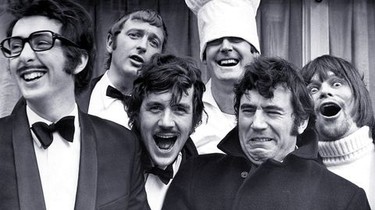 Monty Python was a British comedy troupe that primarily ran from 1969 to 1983 (though they have reunited plenty of times since).
Monty Python was a British comedy troupe that primarily ran from 1969 to 1983 (though they have reunited plenty of times since).
Thanks to their unique surrealist and satirical humor, the Pythons have left a foot-shaped mark in not only pop culture, but comedy a whole. Whether you realize it or not, many comedic tropes (ie: coconut horse clopping sound effect) come directly from the Pythons themselves!
The six first began their silly antics (all together, that is) with their sketch comedy show, Monty Python's Flying Circus. Along with live action comedy sketches, the show also featured the animations of Terry Gilliam. The show was four seasons long and ran from 1969 until 1974.
Outside of the Flying Circus, the Pythons created several films.
Monty Python and the Holy Grail (1975) was their second (and by far most popular) film. A comedic retelling of Arthurian legend, the Holy Grail was created on a low budget and was backed by several bands such as Pink Floyd and Jethro Tull. The film notably features obstacles such as the ever fearsome "killer rabbit" and the arrogant Black Knight. More recently, Python Eric Idle adapted the film as a musical called Spamalot, which was first performed in 2004.
Monty Python's Life of Brian (1979) was their most controversial film, as it followed... well... the life of a man named Brian who has been mistaken for the Messiah, but has no desire to be followed as such. Due to the touchy subject matter (religion), most people didn't want to support the movie's creation. However, George Harrison of the Beatles fully supported the Pythons in their funding. In thanks, Harrison was given a cameo.
Monty Python's Meaning of Life (1983) was their final film. While it loosely followed the life of a character, it was a return to the group's roots; a collection of sketches containing the Pythons' most off-putting and disturbing jokes.
 Graham Chapman (1941-1989) was a talented actor, writer, and comedian. Usually playing the "straight man", Chapman often played authoritative figures in Monty Python projects such as the Colonel and the lead in others, like King Arthur and Brian Cohen.
Graham Chapman (1941-1989) was a talented actor, writer, and comedian. Usually playing the "straight man", Chapman often played authoritative figures in Monty Python projects such as the Colonel and the lead in others, like King Arthur and Brian Cohen.
Chapman was an incredibly gifted man with an interest in science, acting, and comedy. He graduated from Emmanuel College, Cambridge, and St Bartholomew's Hospital Medical College before turning down a career as a doctor in favor of being a bit silly.
During his time at Emmanuel College, Cambridge, Chapman met and began working with John Cleese in the Cambridge Footlights. After graduating, he toured with the Footlights before returning to his medical studies. However, his love of comedy and acting eclipsed the love he had for medicine; he got his doctorate while working alongside John Cleese for the BBC.
Chapman was an alcoholic, though he had just quit when work began on Life of Brian.
The comic's life was sadly cut short at the age of 48 due to tonsil cancer that had spread to his spine.